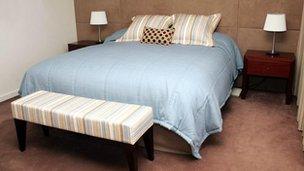'Bedroom tax' to cost Scottish tenants on housing benefit £53m a year
- Published

The under-occupancy penalty for people on housing benefit has been dubbed a "bedroom tax"
Changes to housing benefit which have been dubbed a "bedroom tax" could cost Scots council and housing association tenants £53m a year, a study claims.
Families on housing benefit will be assessed for the number of bedrooms they actually need.
The Scottish Local Government Forum Against Poverty and Rights Advice Scotland estimate that as many as 95,000 tenants could be affected.
The UK government wants to cut the £23bn annual bill for housing benefit.
It argues the occupancy criteria will free up more living space for overcrowded families and encourage people to get jobs.
The joint report on the impact of welfare reforms has been produced by the Scottish Local Government Forum Against Poverty and Rights Advice Scotland.
It claims that those hardest hit will be families with young children, people with disabilities and social housing tenants.
'Financial damage'
The analysis breaks down how many people may be affected area-by-area and estimates that across Scotland 39% of tenants of working age who receive housing benefit are under-occupying.
Typically they will lose between £9 and £12 a week in benefit.
The highest proportion of under-occupancy is in East Dunbartonshire - where 56% of working age tenants are on housing benefit - while the lowest is in Perth and Kinross, at just 20%.
Many of Scotland's councils have warned that they have very few one bedroom houses, meaning they have to house single people in bigger homes.
Dundee Council has already said it will not evict tenants who get into genuine arrears because they are getting less housing benefit.
The report also warns that the wider impact of benefit reforms - including a benefit cap, child benefit changes and changes to disability allowance assessments - will add up to £2.1bn in Scotland.
Richard Gass, chairman of Rights Advice Scotland, said: "Much of the public's anger is currently turned on the unfair and discriminatory 'bedroom tax' despite it representing less than 5% of the total cuts being made.
"While the unfairness of the 'bedroom tax' makes this understandable it is important that we don't lose sight of the much larger financial damage being inflicted by other measures."
- Published17 March 2013
- Published24 February 2013